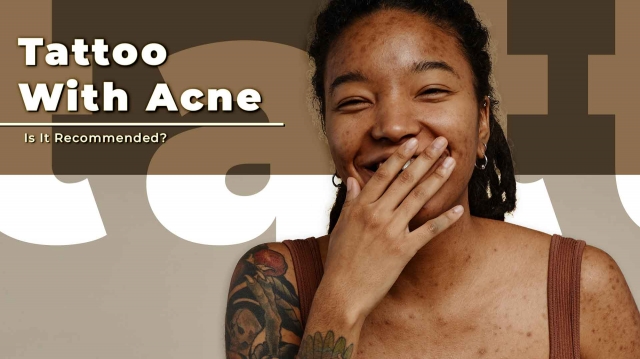Getting a tattoo is an exciting and personal experience for many people, allowing them to express their individuality and create meaningful art on their bodies. However, if you're considering getting a tattoo in an area affected by pimples, it's crucial to approach the process with caution and awareness. Tattooing over pimples requires careful consideration and proper preparation to ensure the best possible outcome.
Living with acne can be challenging, affecting not only your physical appearance but also your self-esteem and confidence. The desire to cover up acne with a tattoo is understandable, but it's important to proceed thoughtfully. The presence of active pimples can significantly impact the tattooing process and potentially lead to complications and unsatisfactory results. Therefore, you should take certain measures to ensure the health of your skin, as well as the longevity and visual appeal of your tattoo.
In this article, we will delve into the essential steps you should take when contemplating a tattoo over pimples, so you can make informed decisions and achieve a successful result that you'll be proud to wear.
Is It Possible to Get a Tattoo Over Acne and Acne Scars?
Tattooing over acne scars is a viable option for individuals. While the tattoo can help minimize the visibility of the scars, it does not alter the texture of the skin. Scar tissue forms as a result of the immune system's effort to repair skin damage. Acne scars can either appear raised or indented, depending on the amount of collagen present in the skin.
It is generally advised to avoid tattooing over fresh scar tissue due to its high sensitivity. Those interested in tattooing over acne scars or any other type of scar tissue should seek guidance from a skilled tattoo artist.
Furthermore, it is important to refrain from getting a tattoo during an active breakout. The tattooing process may spread bacteria to other areas of the skin or exacerbate existing pimples. It is safe to proceed with a tattoo once the breakout has subsided.
What to Consider Regarding Acne Before a Tattoo Appointment?
Before scheduling a tattoo appointment, there are several factors to consider regarding acne breakouts:
- Active Breakouts: It is generally advisable to avoid getting a tattoo during an active acne breakout. Tattooing over active pimples can worsen the condition and potentially spread bacteria to other areas of the skin.
- Healing Time: Acne breakouts need time to heal properly. It is essential to allow the skin to recover fully before considering a tattoo. Attempting to cover up fresh acne lesions with a tattoo can lead to complications and hinder the healing process.
- Skin Sensitivity: Acne-prone skin can be sensitive and reactive. Tattooing over sensitive skin can cause increased inflammation, redness, and discomfort. It is crucial to have a stable and calm skin condition before proceeding with a tattoo.
- Consultation with a Dermatologist: If you have concerns about tattooing over acne-prone skin, it is recommended to consult with a dermatologist. They can assess the condition of your skin, provide guidance on managing breakouts, and offer advice specific to your situation.
- Skilled Tattoo Artist: Choosing an experienced and knowledgeable tattoo artist is crucial, especially when considering tattooing over acne or acne scars. An experienced artist can evaluate your skin's condition, provide appropriate recommendations, and ensure the best possible outcome.
Ultimately, prioritize the health and well-being of your skin. Waiting until your acne breakouts have resolved and seeking professional advice will help ensure a successful and safe tattooing experience.
How to Prevent Breakouts Around Your Tattoo
To minimize the risk of breakouts around your tattoo and promote healthy skin during the healing process, consider the following preventive measures:
- Cleanliness: Follow proper hygiene practices to keep the tattooed area clean. Gently wash the tattoo with a mild, fragrance-free soap and lukewarm water. Avoid using harsh cleansers or scrubbing the area vigorously.
- Moisturization: Keep the tattooed skin properly moisturized to prevent dryness and irritation. Use a fragrance-free and non-comedogenic moisturizer recommended by your tattoo artist or dermatologist. Apply it in thin layers and avoid over-application, as excessive moisture can clog pores.
- Avoid Touching: Refrain from touching or picking at the tattooed area, as this can introduce bacteria and irritate the skin. Keep your hands clean and avoid scratching or rubbing the tattoo.
- Clothing Choices: Opt for loose-fitting and breathable clothing to allow air circulation around the tattoo. Tight clothing can cause friction and irritation, potentially leading to breakouts.
- Avoid Sun Exposure: Protect your tattoo from direct sunlight during the healing process. UV rays can damage the skin and prolong the healing time. If you need to be outdoors, cover the tattooed area with clothing or apply a broad-spectrum sunscreen with a high SPF.
- Avoid Excessive Moisture: Minimize prolonged exposure to water, such as long showers, baths, or swimming, as it can soften the scabs and prolong the healing process. Pat the tattoo gently dry after washing and avoid excessive moisture or soaking.
- Non-irritating Products: Avoid using harsh or heavily scented products on or around the tattooed area. This includes creams, lotions, perfumes, and other skincare products that may contain potential irritants.
- Healthy Lifestyle: Maintain a healthy lifestyle by eating a balanced diet, staying hydrated, and managing stress. These factors can contribute to overall skin health and reduce the likelihood of breakouts.
If you notice any signs of infection, excessive redness, or persistent breakouts, it is essential to consult with your tattoo artist or seek medical advice from a dermatologist promptly. They can provide guidance and recommend appropriate treatments to address any issues related to your tattoo or skin condition.
Final Thoughts on Tattooing Over Pimples
Tattooing over pimples requires careful planning and consideration to achieve the desired results. Allow the pimples to heal, consult with a professional tattoo artist, follow a skincare routine, and postpone the appointment if necessary. With patience, proper aftercare, and regular follow-up, you can ensure a successful tattooing experience while taking care of your skin's health.
Remember, your skin is a valuable canvas, and it's essential to prioritize its well-being before and after getting a tattoo.






